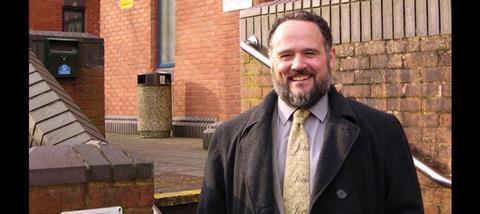Following the conviction of two street preachers, Christians are asking questions about how to preach an offensive gospel with gentleness and respect. Sam Hailes reports.

Last month two evangelists were found guilty of a “religiously aggravated public order offence” after preaching to passers-by inside a Bristol shopping centre. The ruling was criticised by many Christians as unjust. Some even suggested it was part of a wider campaign to marginalise people of faith and clamp down on freedom of speech. But is this really the case?
CENSORING THE BIBLE
Mike Overd from Taunton, Somerset and Michael Stockwell from New York City have always claimed they were simply proclaiming the gospel inside Broadmead Shopping Centre in Bristol last summer. But the pair have now been convicted of using “threatening or abusive words…likely to be causing harassment, alarm or distress” and ordered to pay fines and costs totalling £3,372.
This was the third time Overd has faced prosecution for preaching. He was found not guilty in 2012 and guilty in 2015, although this second conviction was overturned on appeal.
Speaking on Premier Christian Radio’s News Hour programme, Mike Overd was adamant he’d done nothing wrong, claiming the public proclamation of the gospel has always been clamped down on by the authorities.
The prosecution alleged Overd had called the crowd “depraved and ignorant”, described Mohammed as a liar and referred to extra-marital sex and homosexuality as “filthy, depraved and perverted”.
But Andrea Williams from the Christian Legal Centre, who supported the preachers, suggested they had been prosecuted for merely quoting scripture.
Citing the prosecution’s argument in court, Williams said it was “extraordinary” that the state could suggest that “the Bible contains abusive words which, when spoken in public, constitute a criminal offence”. For those who support the preachers, the sentence amounts to a ban on parts of scripture being read aloud in public.
DOES STREET PREACHING WORK?
Setting aside the legal arguments, some Christians argue that street preaching no longer works. Founder of the Pioneer network Gerald Coates recently said that street preaching is “the least effective way” of communicating the gospel. He prefers engaging people in conversation, arguing that “personal contact” yields far more results.
Martin Holmes from Open Air Ministries supports street preaching, and says: “We need to be winsome to win some.” The word ‘winsome’ is underpinned by 1 Peter 3:15 which exhorts believers to speak to non-Christians with “gentleness and respect”.
However, a results-driven approach isn’t always the priority for open-air evangelists. For Overd, there are larger issues at stake and street preaching allows Christians to be bold in proclaiming truth. He believes the true gospel is in danger of being watered down – even by major Christian leaders: “I can’t tell the difference between the Archbishop of Canterbury, a politician and a social worker. They all sound the same. I never hear the gospel – a call to the nation to repent of our sin and come back to God. I never hear that message from our church leaders and I question that.”
TAKING OFFENCE
In recent years society has been asking big questions about whether or not free speech should be limited.
Last year David Cameron criticised society for being “passively tolerant”. He said that being “neutral between different values” has helped foster “a narrative of extremism”. This led to him proposing counter extremism measures which are still being considered by Parliament and which the Evangelical Alliance believe could penalise “those with controversial or unpopular opinions”.
Street preachers have a reputation for talking about subjects that aren’t palatable to today’s culture (Overd for example has preached about hell and homosexuality). But it isn’t just Christians who want to protect the rights of religious speakers to make offensive comments. When Pastor James McConnell was taken to a Belfast court last year after preaching “Islam is Satanic”, he found unlikely support from both the National Secular Society and Sheikh Dr Muhammad Al-Hussaini – a Senior Fellow in Islamic Studies at the Westminster Institute. Dr Al-Hussaini told Premier Christianity the not guilty verdict was “a just and responsible verdict which upholds the academic freedom of all of us...to debate and discuss religious ideas”.
Although Pastor McConnell won his court case, he admitted he would preach “differently” in the future. “I would do it again but I would word it differently” he said.
Overd has been less apologetic. When asked if his style of street preaching could put people off Christianity, he said, “You could say the same of the prophets…If you’re called and you go with the right intention, it isn’t the preaching of the gospel that drives people away. It’s their sin.”
ARRESTED FOR THE GOSPEL?
Overd views himself as being on the front line. He questions why so many preachers never leave the four walls of the church. Even those who don’t adopt Overd’s methods might still agree with his observation that non-Christians often “won’t come into our buildings”.
Importantly, if the street preachers in this case have been convicted solely for quoting scripture, then we are witnessing a watershed moment. In the past, Christians have defended themselves by arguing they were merely quoting what the Bible says. If that defence is no longer valid, it has significant implications.
The courts may be able to answer the legal question of whether preachers should be permitted to make offensive remarks. But the moral question of whether preachers should choose to avoid language that others find derogatory or hateful, remains.
Paul and Silas were thrown in prison after being accused of “throwing our city into an uproar” (Acts 16:20). Paul was accused of being a “troublemaker…stirring up riots” (24:5). But it’s hard to argue that the apostles purposely looked for this sort of trouble. On the contrary, their ambition was “to lead a quiet life…so that your daily life may win the respect of outsiders” (1 Thessalonians 4:11-12)
Nevertheless, being arrested for preaching the gospel is seen as a badge of honour among some street preachers. But if a Christian finds themselves in trouble with the law for their method of evangelism, rather than the message itself, they are not being persecuted for Christ. They’re just disturbing the peace. To put it another way: The gospel is offensive. But we don’t have to be.
Overd is planning to appeal his conviction. When asked if he’s confident his appeal will be successful, his answer was as scripture-centred as you might expect from a street preacher: “I’m confident in my Father in heaven, whatever happens.”





































No comments yet